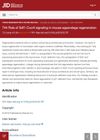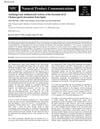 57 citations,
April 2002 in “The journal of investigative dermatology/Journal of investigative dermatology”
57 citations,
April 2002 in “The journal of investigative dermatology/Journal of investigative dermatology” Vitamin D receptor is crucial for starting hair growth after birth.
 April 2016 in “Journal of Investigative Dermatology”
April 2016 in “Journal of Investigative Dermatology” Mice without the p21 gene can fully regenerate injured ears due to reduced Sdf1 increase and leukocyte recruitment, suggesting new ways to induce tissue regeneration in mammals.
July 2016 in “Cancer research” Mutant cells in hair follicles are influenced by their location and interactions with surrounding cells.
 6 citations,
October 2013 in “Plastic and Reconstructive Surgery – Global Open”
6 citations,
October 2013 in “Plastic and Reconstructive Surgery – Global Open” HSL treatment speeds up hair growth and reduces oxidative stress in hair follicles of ob/ob mice.
51 citations,
August 2013 in “The Journal of experimental medicine/The journal of experimental medicine” Loss of a specific protein in skin cells causes symptoms similar to psoriasis.
 3 citations,
May 2018 in “Biochemical and Biophysical Research Communications”
3 citations,
May 2018 in “Biochemical and Biophysical Research Communications” iNOS contributes to hair loss in obese diabetic mice and blocking it may encourage hair growth.
5 citations,
October 2022 in “Biology” CAP1 helps Arabidopsis plants grow better under ammonium stress.
14 citations,
April 2013 in “Journal of dermatological science” Hairless protein reduces Msx2 gene activity, affecting hair follicle development.
 2 citations,
January 2000 in “Elsevier eBooks”
2 citations,
January 2000 in “Elsevier eBooks” The document explains how hair is studied in forensics to identify its source and its role in criminal investigations.
 4 citations,
November 2022 in “Frontiers in endocrinology”
4 citations,
November 2022 in “Frontiers in endocrinology” The enzyme 5α-reductase type 1 is important for blood vessel development and fertility in the uterus.
2 citations,
September 2017 in “Journal of Investigative Dermatology” Notch1 signaling is impaired in hidradenitis suppurativa, affecting skin and hair cells.
26 citations,
June 2016 in “Frontiers in Plant Science” Autofluorescence can sort plant cells without labeling.
 8 citations,
February 2015 in “Cellular immunology”
8 citations,
February 2015 in “Cellular immunology” Deleting Snai2 and Snai3 causes fatal autoimmunity.
 64 citations,
August 2014 in “The journal of allergy and clinical immunology/Journal of allergy and clinical immunology/The journal of allergy and clinical immunology”
64 citations,
August 2014 in “The journal of allergy and clinical immunology/Journal of allergy and clinical immunology/The journal of allergy and clinical immunology” A deficiency in the TTC7A gene causes immune problems, gut issues, and hair loss.
42 citations,
December 2011 in “The journal of immunology/The Journal of immunology” RANKL causes lymph nodes to grow by making certain cells multiply.
 January 2025 in “Sustainable food connect.”
January 2025 in “Sustainable food connect.” Gene editing is the future of efficient and precise animal breeding.
October 2021 in “Authorea (Authorea)” New hair perming method using tyrosine is gentler and can be done with a blow-dryer.
16 citations,
August 2012 in “The journal of investigative dermatology/Journal of investigative dermatology” MED1 is essential for normal hair growth and maintaining hair follicle stem cells.
 April 2023 in “Journal of Investigative Dermatology”
April 2023 in “Journal of Investigative Dermatology” A protein called MPZL3 in mitochondria slows down hair growth and could be a target for treating hair growth disorders.
 11 citations,
January 2012 in “Journal of cell science”
11 citations,
January 2012 in “Journal of cell science” Rac1 is essential for proper hair structure and color.
 9 citations,
October 2012 in “Natural Product Communications”
9 citations,
October 2012 in “Natural Product Communications” The essential oil from Chamaecyparis lawsoniana has strong antibacterial and antifungal effects, especially against yeast and Gram-positive bacteria.
 March 2024 in “bioRxiv (Cold Spring Harbor Laboratory)”
March 2024 in “bioRxiv (Cold Spring Harbor Laboratory)” Minoxidil treatment improves heart defects in a DiGeorge syndrome model.
 74 citations,
June 2018 in “Cell death and disease”
74 citations,
June 2018 in “Cell death and disease” Restoring mitochondrial function in mice reversed their skin wrinkling and hair loss.
 28 citations,
March 2010 in “Histochemistry and cell biology”
28 citations,
March 2010 in “Histochemistry and cell biology” Skin cells can help create early hair-like structures in lab cultures.
 72 citations,
January 2003 in “American Journal of Pathology”
72 citations,
January 2003 in “American Journal of Pathology” A protein called CBP is found in prostate cancer and can increase the effectiveness of certain prostate cancer treatments.
 12 citations,
January 1981 in “Springer eBooks”
12 citations,
January 1981 in “Springer eBooks” Environmental factors like temperature and nutrition affect hair growth, with humans showing seasonal hair growth differences.
 384 citations,
June 2005 in “Genes & development”
384 citations,
June 2005 in “Genes & development” β-catenin is essential for stem cell activation and proliferation in hair follicles.
 December 2012 in “Journal of Dermatological Science”
December 2012 in “Journal of Dermatological Science” Wnt/beta-catenin signaling in the skin helps fat cell development during hair growth and repair.
43 citations,
December 2006 in “The American journal of pathology” Edar signaling is crucial for controlling hair growth and regression.
 June 2024 in “ESMO Gastrointestinal Oncology”
June 2024 in “ESMO Gastrointestinal Oncology” The combination treatment showed a higher response rate but no significant survival benefits.



















